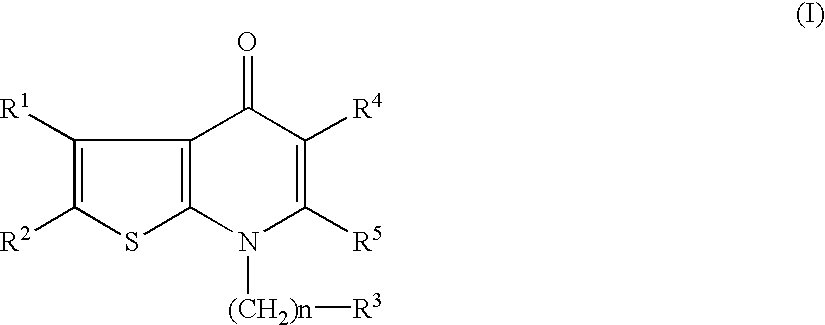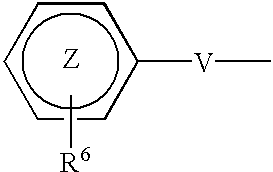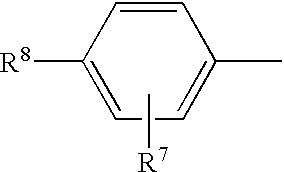Condensed-ring thiophene derivatives, their production and use
a technology of condensed thiophene and derivatives, applied in the direction of heterocyclic compound active ingredients, biocide, drug compositions, etc., to achieve the effect of suppressing the secretion of gonadotropic hormone, safe use, and low toxicity
- Summary
- Abstract
- Description
- Claims
- Application Information
AI Technical Summary
Benefits of technology
Problems solved by technology
Method used
Image
Examples
reference example 1
2-Amino-5-phenylthiophene-3-carboxylic Acid Ethyl Ester
To a mixture of ethyl cyanoacetate (6.1 g, 50 mmol), sulfur (1.61 g, 50 mmol) triethylamine (3.5 ml, 25 mmol) and dimethylformamide (10 ml) was added dropwise, with stirring at 45.degree. C., phenylacetaldehyde (50% diethylphthalate solution; 12.05 g, 50 mmol) for 20 minutes. The mixture was stirred for 9 hours at 45.degree. C., and the reaction mixture was concentrated. The resulting residue was extracted with ethylacetate. The extract was washed with an aqueous sodium chloride solution, which was then dried (MgSO.sub.4), followed by distilling off the solvent under reduced pressure. The residue was chromatographed on silica gel, followed by crystallization from ether-hexane to give slightly yellow plates (5.55 g, 45%), m.p.124.5-125.5.degree. C. (value in literature reference 123-124.degree. C.).
Elemental Analysis for C.sub.13 H.sub.13 NO.sub.2 S: C(%) H(%) N(%) Calcd.: 63.13; 5.30; 5.66 Found: 62.99; 5.05; 5.63 .sup.1 H-NMR (...
reference example 2
2-Amino-4-methyl-5-(4-methoxyphenyl)thiophene-3-carboxylic Acid Ethyl Ester
A mixture of 4-methoxyphenylacetone (16.5 g, 0.10 mol), ethyl cyanoacetate (12.2 g, 0.10 mol), ammonium acetate (1.55 g, 20 mmol), acetic acid (4.6 ml, 80 mmol) and benzene (20 ml) was heated for 24 hours under reflux, while removing water produced in the reaction mixture using a Dean and Stark apparatus. After cooling, the reaction mixture was concentrated under reduced pressure. The residue was partitioned between dichloromethane and an aqueous sodium hydrogencarbonate solution. The organic layer was washed with an aqueous sodium chloride solution, which was then dried (MgSO.sub.4), followed by distilling of the solvent under reduced pressure. To an ethanol (30 ml) solution of the residue were added sulfur (3.21 g, 0.10 mol) and diethylamine (10.4 ml, 0.10 mol). The mixture was stirred at 50-60.degree. C. for 2 h and then concentrated, and the concentrate was extracted with ethyl acetate. The extract was wa...
reference example 3
Employing various acetone derivatives in place of 4-methoxyphenylacetone, compounds shown in Table 1 were produced in accordance with substantially the same manner as described in Reference Example 2.
TABLE 1 ##STR45## R. Ex. 3 Yield m.p. Cpd. No. R.sup.20 R.sup.21 (%) (.degree. C.) 1 methyl phenyl 40 64-65 2 methyl 2-methoxyphenyl 12 70-71
PUM
 Login to View More
Login to View More Abstract
Description
Claims
Application Information
 Login to View More
Login to View More - R&D
- Intellectual Property
- Life Sciences
- Materials
- Tech Scout
- Unparalleled Data Quality
- Higher Quality Content
- 60% Fewer Hallucinations
Browse by: Latest US Patents, China's latest patents, Technical Efficacy Thesaurus, Application Domain, Technology Topic, Popular Technical Reports.
© 2025 PatSnap. All rights reserved.Legal|Privacy policy|Modern Slavery Act Transparency Statement|Sitemap|About US| Contact US: help@patsnap.com



